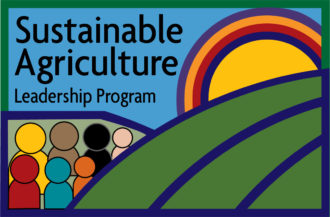GRIFFIN, Georgia -- The Southern region Sustainable Agriculture Research and Education (SSARE) program is seeking nominations for its Sustainable Agriculture Leadership Program for summer 2023. The application deadline is January 9, 2023.
Mentor farmers/ranchers, community groups, non-profits and non-governmental organizations strive to create ag community resiliency and vitality in the face of a myriad of agricultural challenges, from lack of access to land, to issues in technology, to concerns regarding family matters and health.
The Sustainable Agriculture Leadership Program, operated by Southern SARE’s Equity and Prosperity Committee, champions the leadership contributions of these groups and individuals by providing a small amount of sponsorship funds (up to $3,000) to support sustainable agriculture education and training activities throughout the Southern region. Note that this is not a grant.
The purpose of the program is to enhance the resiliency, strength and vivacity of farmer and ranchers, particularly historically underserved audiences. Historically underserved farmers and ranchers and non-governmental organizations that serve those audiences within the Southern region are invited to apply.
In addition, the individual farmer/rancher, farmer group or NGO selected to participate in the Sustainable Agriculture Leadership Program will be recognized for their contributions through a series of communications pieces developed by Southern SARE.
Youth-related projects are not eligible. Activities must benefit farmers/ranchers as the end audience.
In order to be considered, the nomination form and budget request form must be completed and emailed to Brennan Washington at washingtonb@fvsu.edu by January 9, 2023. At that time, Southern SARE will review nominations and select recipients.
If selected, education and training activities must be completed by July 14, 2023.
For more information, contact Brennan Washington at washingtonb@fvsu.edu
Requirements to Apply
Who is Eligible:
- Mentor farmers/ranchers, particularly historically underserved farmers/ranchers in leadership positions in their community.
- Farmer groups who have demonstrated leadership contributions, particularly those who serve historically underserved farmers and ranchers.
- NGOs or other community groups who have demonstrated leadership contributions, particularly those who serve historically underserved farmers and ranchers.
SSARE defines underserved communities as those populations sharing a particular characteristic, as well as geographic communities, that have been systematically denied full opportunity to participate in aspects of economic, social, and civil life.
Funding Amount:
The maximum funding amount requested is $3,000.
Activities funded must be completed by July 14, 2023.
What the Funding Supports:
The sponsorship funds:
- Education and training activities to help farmers, particularly historically underserved farmers/ranchers, further sustainable ag practices. Youth-related projects are not eligible.
- Activities must demonstrate that the outcomes will benefit farmers and ranchers as the end audience;
- Activities must pertain to sustainable agriculture topics. Such topics can include, but are not limited to ag production, heirs property, education and training resources, safety and health, market challenges, food access, disaster recovery, access to technology, and stress and mental health;
- Activities can be in-person or online. They can include, but are not limited to farmer field days, “how-to” demonstrations, curriculum/course development, training manuals, webinars, workshops, and hands-on training.
Allowable Budget Items
The following budget items are allowable expenses, based on USDA-NIFA rules and regulations. Each budget item requested must be allowable, justified and itemized. Any items listed that do not fall under this allowable list will be rejected.
Allowable Budget Items:
- Meals
- Lunches and refreshments only when the food is part of the costs of the continuity of the event. Is food necessary for continuity to achieve event goals? Lunches must serve an educational purpose. Award luncheons are not allowed. Breakfasts are not allowed.
- Dinner only when the food is part of the costs of the continuity of the event, and if there is a speaker or educational program held during the dinner. The dinner must serve the purpose of disseminating educational and technical information. Award dinners are not allowed.
- Travel for event speakers and presenters only
- Registration of event for speakers or presenters
- Transportation costs of speakers or presenters per federal mileage guidelines
- Lodging for speakers or presenters NOTE: Per University of Georgia policy, only hotels/motels are allowable lodging establishments for reimbursement. Businesses, such as Airbnb, Vrbo, HomeAway, condos/townhomes, or similar vacation rentals are not allowable lodging services. International travel is not allowed.
- Rental of event facilities or planning spaces. This can include convention center/conference/hotel spaces, community centers, church spaces for non-religious purposes, and on-farm locations. Tents or canopies are allowed as long as educational sessions take place under that space. General supplies (tables, chairs, port-o-johns, paper products, etc.) are not allowed. Entertainment, such as social activities/film screenings, and entertainment venues, such as breweries, eateries or similar, are not allowed.
- Technical equipment rentals, such as audio visual technologies, online webinar fees, photography, graphic design, etc.
- Speaker or presenter fees
- Incidental items in support of the event, such as printing of publications or marketing materials; training materials; books; brochures; posters/flyers; or advertising. Items must be educational resources.
Program Evaluation
In order to evaluate the effectiveness of the project activity, program participants will be asked to provide evaluation materials at the conclusion of their project. This can include a video, an impact report, or other evaluation documents. Failure to submit an evaluation report can prohibit the recipient from receiving Southern SARE sponsorship funding in the future.
Program Recognition
In addition to funding support, Southern SARE will recognize those participating in the program through a series of communications materials. These materials can include videos, photos, podcast interviews, press releases, and other communications efforts that will enable program participants to share their stories and share their project activity with the greater sustainable ag community across the Southern region.
